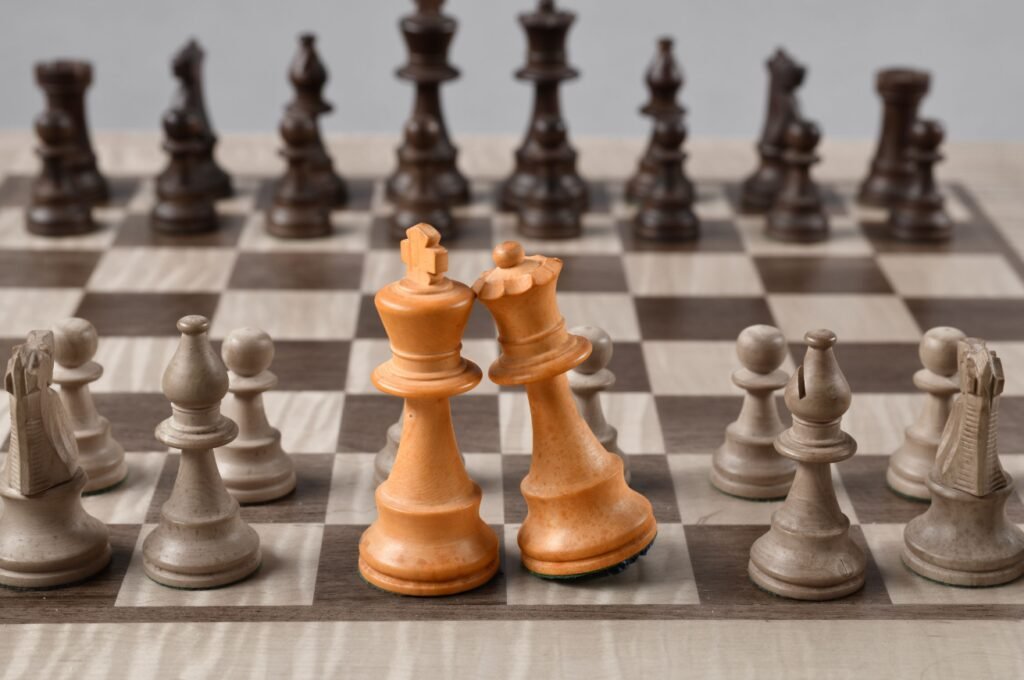When we hear the word “chess”, images of intellectual battles, deep strategy, and calculated moves come to mind.
Unsurprisingly, love can share some surprising parallels with this intricate game.
Courtship and building a strong, lasting relationship involve much more than just a spark of initial attraction. It’s a dance of subtle maneuvers, careful observation, and knowing when to make bold advances.

Opening Moves: Understanding the Board
In chess, understanding the starting positions of the pieces is critical.
Similarly, knowing yourself and the type of man you’re interested in is the foundation of a successful love conquest.
Ask yourself:
- What are your values, goals, and priorities? Understanding these helps you search for someone who aligns with your vision of a fulfilling partnership.
- What kind of personality complements your own? Do you prefer someone outgoing and adventurous or calmer and introspective? Defining your ideal match saves time and heartache.
- The “Him” Factor: It’s perfectly fine to have preferences in terms of personality, interests, and even appearance. While you shouldn’t fixate on a rigid ideal, envisioning the man you’d like by your side guides your actions.
Just as chess players observe an opponent’s initial moves, pay attention to your potential partner’s actions.
Do his words and behavior resonate with your ideal match?
This early stage is the prime time for gauging compatibility.
The Middle Game: Strategy and Calculated Risks
Once you have a sense of the “board” – yourself and your ideal partner – strategy comes into play.
This isn’t about manipulation, but rather thoughtful positioning to make a memorable impression:
- Intrigue and Reciprocity: Don’t overshare. Mystery adds allure. Encourage him to learn about you over time through a balance of openness and leaving something to the imagination.
- Shared Experiences: Bonding over a common interest – a sport, hobby, or intellectual pursuit – creates connection. However, don’t feign interest if it’s not genuine; enthusiasm is contagious.
- The Power of Touch: Discreet and respectful physical touch has remarkable power. A light touch on the arm during conversation or a gentle brush of hands can leave a memorable impression.
Like the calculated risks of sacrificing minor pieces in chess, sometimes romantic gestures require courage.
A sincere compliment, offering thoughtful help, or even a direct invitation to spend time together can change the dynamics of the game.
Patience and Observation: The Art of Reading Your Opponent
In chess, hasty moves can lead to blunder and loss.
Love is similar; rushing intimacy or forcing emotional declarations will likely backfire.
Here’s how to refine your observation skills:
- Decoding Body Language: Pay attention to his non-verbal cues. Does he lean in during conversation, maintain eye contact, or subtly mirror your body posture? These signals can reveal more than words.
- Listen Actively: Does he ask about your life and opinions? Respond with enthusiasm when you feel comfortable opening up? Healthy relationships thrive on mutual interest.
- Patterns of Behavior: His generosity, kindness to others, and the way he handles setbacks speak volumes. Don’t ignore red flags that contradict your values. Attraction is important, but character matters more in a lasting partnership.
The Endgame: Making Your Decisive Move
In chess, the endgame is the culmination, the point where victory is secured.
In love, this is when a deeper connection is established, vulnerability is shared, and commitment solidifies.
Keep in mind:
- Equality: A true partnership is never one-sided. If all the effort, emotional investment, and concessions are always coming from you, it’s not a genuine match.
- Honesty, Not Games: If your feelings have grown, be upfront about them. A mature heart will appreciate direct, authentic communication, leaving no room for misinterpretation.
- Accept the Answer: Rejection stings, but the sooner you know where you stand, the sooner your heart can heal or find a more suitable match. Ghosting and game-playing reveal a lack of respect that you frankly deserve to avoid.

Beyond Checkmate: Keeping Love Alive
Even the most skillfully won chess game means little if you never play again.
Similarly, finding love is just the beginning.
Nurturing a relationship takes continuous effort and adaptability:
- Anticipation vs. Routine: Predictability breeds boredom. Just like finding creative tactics to surprise an opponent, keep your partner engaged and on their toes. Spontaneous gestures, new experiences, and even playful banter maintain a sense of excitement.
- Playful, Not Possessive: Chess is about outsmarting the opponent, not controlling them. Allow your partner space to pursue their individual passions and friendships. This confidence is attractive and fosters trust.
- Learning Together: Life is a constant learning curve. Encourage and celebrate each other’s growth. Whether it’s pursuing new hobbies, learning a skill, or tackling challenges, support creates a lasting sense of teamwork.
- “Losing” with Grace: Disagreements are inevitable. Approach conflict like a chess puzzle to solve together. Aim for compromise and understanding rather than needing to always be “right”.
Important Considerations
While the metaphor of chess offers a framework to consider your approach to love and relationships, it’s important to acknowledge a few key things:
- Love Isn’t a Zero-Sum Game: In chess, there’s one winner and one loser. Real partnerships thrive on mutual respect, fulfillment, and support. Neither person should feel chronically sacrificed or diminished to “win” the love they want.
- People are NOT Chess Pieces: Manipulation and rigid control have no place in genuine affection. Love flourishes when you’re appreciated for who you are, not molded into someone else’s ideal.
- Self-Worth is Your Queen: The most valuable “piece” on your board is your sense of self-worth. Never sacrifice your values, happiness, or well-being in pursuit of any relationship. A real partnership elevates you, it doesn’t compromise who you are.
A Final, Powerful Move
The beauty of chess is that even when a game is over, you can analyze, learn, and strive to play better the next time. The same is true in love.
Each relationship, even those that don’t last, offers invaluable lessons:
- Refinement, Not Regret: Heartbreak, while painful, teaches resilience and sharpens your idea of the ideal partner for you. View any ending as refining your strategy, not a personal defeat.
- Knowing Your Worth: Don’t settle for a partner who plays mind games or doesn’t fully appreciate the depth and intelligence you bring to the table. Hold out for someone who values your moves and sees them clearly.
- Enjoying the Game: The pursuit of love should be exciting, even when there’s occasional frustration. If finding a partner always feels like a grueling chore, it’s time for healthy self-reflection. When you love who you are, the whole process becomes more joyful.

Romantic connections, like a skilled chess match, offer the potential for profound learning, satisfaction, and the exquisite thrill of meeting a worthy opponent turned beloved partner.
May you approach the game of love with confidence, strategy, and most of all, the self-awareness that leads to a resounding “checkmate” for your heart.
